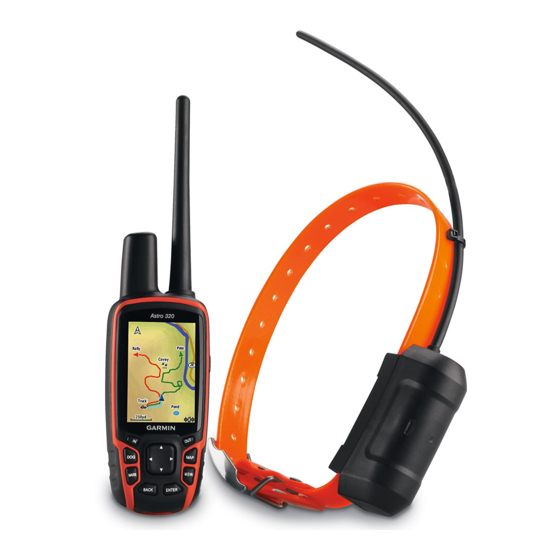The course pointer
indicates your relationship to the course
line leading to the destination. The course deviation indicator
(CDI)
provides the indication of drift (right or left) from the
course. The scale
refers to the distance between dots
the course deviation indicator, which tell you how far off course
you are.
Find Menu
You can use the find menu to search for waypoints, cities, and
coordinates. You can download and navigate to photos, tracks,
and geocaches. Additional categories appear if you have
optional, compatible detailed maps loaded on the device. When
you open a category, the list contains items near your current
location or the map pointer (if active).
Finding a Waypoint by Name
1
From the main menu, select Find > Waypoints > MENU >
Spell Search.
2
Enter the name.
Matches appear as you select characters in the name.
3
Select the waypoint.
Finding a Waypoint Near Another Waypoint
1
From the main menu, select Tools > Waypoint Mgr..
2
Select a waypoint.
3
Select MENU > Find Near Here.
4
Select a category.
The list includes waypoints near the original waypoint.
Navigating with Sight 'N Go
You can point the device at an object in the distance, lock in the
direction, and navigate to the object.
1
Select Tools > Sight 'N Go
2
Point the device at an object.
3
Select Lock Direction > Set Course.
4
Navigate using the compass
Viewing the Elevation Plot
By default, the elevation plot displays the elevation for an
elapsed time. You can customize the plot
data fields
(page
9).
Select Tools > Elevation Plot.
Calibrating the Barometric Altimeter
You can manually calibrate the barometric altimeter if you know
the correct elevation or the correct barometric pressure.
1
Go to a location where the elevation or barometric pressure
is known.
2
Select Tools > Elevation Plot > MENU > Calibrate
Altimeter.
3
Follow the on-screen instructions.
Navigating to a Point on the Plot
1
Select Tools > Elevation Plot.
2
Select a point on the plot.
Details about the point appear in the upper-left corner of the
plot.
3
Select MENU > View Map.
4
Select the information bar at the top of the screen.
5
Select Go.
6
Navigate using the compass
Changing the Plot Type
You can change the elevation plot to display pressure and
elevation over time or distance.
Applications
(page
6) or map
(page
6).
(page
7) and the
(page
6) or map
(page
6).
1
Select Tools > Elevation Plot > MENU > Change Plot
Type.
2
Select an option.
on
Trip Computer
The trip computer displays your current speed, average speed,
maximum speed, trip odometer, and other helpful statistics. You
can customize the trip computer layout, dashboard, and data
fields
(page
9).
To open the trip computer, select Tools > Trip Computer.
Resetting the Trip Computer
For accurate trip information, you can reset the trip information
before beginning a trip.
1
Select Tools > Trip Computer.
2
Select MENU > Reset > Reset Trip Data.
Setting a Proximity Alarm
Proximity alarms alert you when you or your dogs are within a
specified range of a particular location. A tone sounds when you
enter the designated radius.
1
Select Tools > Proximity Alarms.
2
Select Create Alarm.
3
Select a category.
4
Select a location.
5
Select Use.
6
Enter a radius.
When you enter an area with a proximity alarm, the device
sounds a tone.
Calculating the Size of an Area
1
Select Tools > Area Calculation > Start.
2
Walk around the perimeter of the area you want to calculate.
3
When finished, select Calculate.
Viewing the Calendar and Almanacs
You can view device activity, such as when a waypoint was
saved, and almanac information for the sun and moon, and
hunting and fishing.
1
Select Tools.
2
Select an option:
• To view device activity for specific days, select Calendar.
• To view the sunrise, sunset, moonrise, and moonset
times, select Sun and Moon.
• To view the predicted best times for hunting and fishing,
select Hunt and Fish.
3
If necessary, select
Setting an Alarm
1
Select Tools > Alarm Clock.
2
Enter the time.
3
Select Turn Alarm On.
4
Select an option.
The alarm sounds at the selected time. If the device is off at the
alarm time, the device turns on and sounds the alarm.
Applications
or
to view a different day.
7

